
Tick Control Services in Charleston
Charleston, SC, is beloved for its historic architecture, live oaks, and Lowcountry marshlands—but those same coastal conditions create an ideal environment for ticks. Warm, humid weather, shaded landscapes, and abundant wildlife corridors (from the Ashley and Cooper Rivers to tidal creeks and barrier islands) make tick encounters common across the region. For families and pet owners, ticks are more than a backyard nuisance—they can transmit serious diseases. That’s why effective, professional tick control is essential to protect your household and reclaim your yard.
All U Need Pest Control brings decades of coastal pest expertise to Charleston’s unique environment. We pair eco-conscious products with proven methods to break the tick life cycle, reduce activity in the places you live and play, and help prevent resurgence as seasons change. Our approach blends precise inspection, targeted application, habitat modification, and homeowner education—so you get fast relief now and durable protection going forward.
If ticks are turning your lawn, garden, or porch into off-limits zones, act before populations spike with the next warm spell or rain cycle. Call 1 (888) 239-BUGS or reach us online for a free consultation tailored to Charleston’s neighborhoods—from Downtown, West Ashley, and Mount Pleasant to James Island, Johns Island, North Charleston, Daniel Island, Hanahan, Goose Creek, Summerville, and coastal communities like Isle of Palms, Sullivan’s Island, and Folly Beach.
Our motto? "If they're not dead, we're not done!"
Pest Control Services in Charleston County, SC
- Ant Control
- Bed Bug Control
- Beetle Control
- Cockroach Control
- Flea Control
- Home General Pest Control
- Hornet Control
- Millipede Control
- Mosquito Control
- Pantry Pest Control
- Rat & Rodent Control
- Scorpion Control
- Silverfish Control
- Spider Control
- Stink Bug Control
- Termite Control
- Wasp Control
- Winter Control
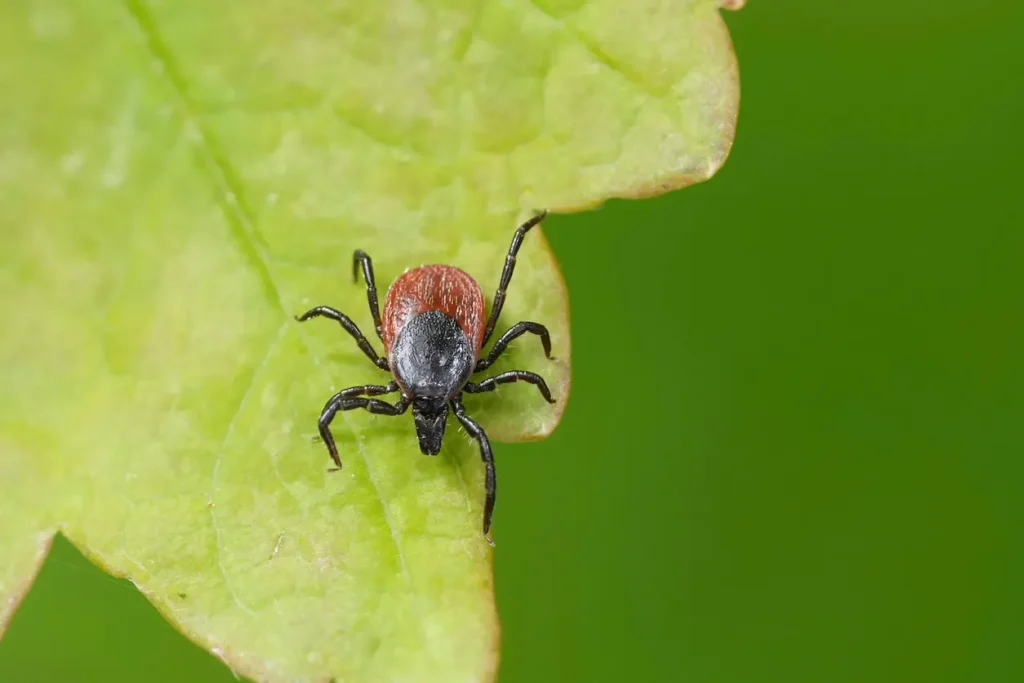
Understanding Tick Behavior
Ticks are parasitic arachnids that feed on the blood of mammals, birds, and sometimes reptiles. In Charleston’s subtropical climate—marked by long, humid summers and mild winters—ticks can remain active for much of the year. Shaded, moist, and brushy environments typical of Lowcountry yards, greenways, and marsh edges give ticks perfect harborage. Understanding their habits and life cycle is the first step to reducing bites and keeping your property safer for people and pets.
The most common tick species found in Charleston include:
- Black-legged tick
- American dog tick
- Brown dog tick
- Lone star tick
These species thrive in the Lowcountry’s patchwork of coastal forests, dense shrub lines, leaf litter, and wildlife corridors. Black-legged ticks (often linked to Lyme disease) prefer shaded, leafy areas and can stay active during cool stretches. American dog ticks and lone star ticks commonly quest along edges—tall grasses, fence lines, and trail margins—waiting for a host to brush by. Brown dog ticks are notorious for infesting kennels and indoor spaces, which makes year-round management crucial for pet owners.
Tick activity in Charleston ramps up as temperatures rise and humidity increases—typically spring through fall, with nymphs often more active in late spring and summer. Nymphs are tiny (and easy to miss) but capable of transmitting disease. That’s why consistent prevention and swift response after outdoor activities are so important in our region.
Here’s how to identify ticks:
- Fully grown ticks measure about the size of an apple seed, while nymphs are smaller, around the size of poppy seeds. Male ticks are usually smaller than females.
- Ticks enlarge considerably when they feed, swelling up with blood.
- A tick’s body is divided into a small head and a large abdomen.
- Ticks have four pairs of legs: the front two face the head, and the back two face the abdomen.
Because Charleston’s tree cover and coastal breezes keep many yards cool and shaded, proactive yard hygiene—paired with professional control—goes a long way. At All U Need Pest Control, we build programs that address each stage of the tick’s life cycle and the specific harborage zones on your property, from wood lines and crawl spaces to dog runs and ornamental beds.
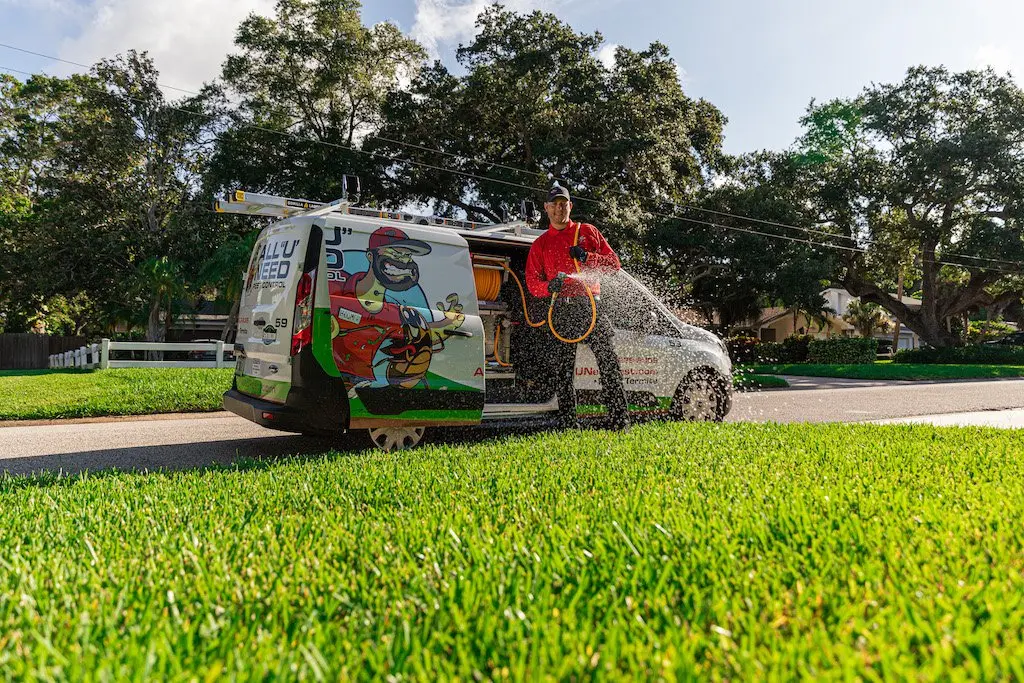
Risks Associated With Ticks
Ticks in Charleston are capable of transmitting several dangerous diseases to both humans and pets. Recognizing the risks helps you take preventive steps and seek care quickly if exposure occurs. While not every bite causes illness, Charleston’s climate and outdoor lifestyle increase the chance of encounters—especially for children, pet owners, gardeners, hikers, and anyone spending time in yards or parks.
Lyme Disease
Lyme disease is transmitted through the bite of infected black-legged ticks. Early symptoms can include fever, fatigue, headache, and a “bull’s-eye” rash at the bite site. Without prompt treatment, Lyme can progress to joint pain, neurological issues, and heart complications. In the Lowcountry, ongoing vigilance—tick checks after outdoor time, proper clothing, and property management—helps lower risk, while professional tick control reduces the likelihood of bites around your home.
Rocky Mountain Spotted Fever
Rocky Mountain spotted fever (RMSF) is caused by bacteria transmitted by ticks, often the American dog tick. Symptoms include fever, headache, and a spreading rash. Without rapid treatment, RMSF can lead to severe complications. If you experience symptoms following a tick bite—or you find a tick attached—seek medical guidance immediately. Reducing tick habitat and treating your property substantially decreases exposure risk.
Tick Paralysis
Tick paralysis occurs when a neurotoxin in a tick’s saliva induces progressive weakness that can advance to serious symptoms, particularly in pets. Removing the offending tick typically reverses the condition, but swift identification matters. Regular tick checks, vet-recommended preventives, and routine yard service form a strong prevention tripod for Charleston pet owners.
While no single measure eliminates risk, an integrated strategy—property modifications, personal protection, and professional service—makes tick-borne illness far less likely for Charleston families.

Signs of Tick Infestation
Catching a tick problem early prevents a small issue from becoming an entrenched infestation. In Charleston’s neighborhoods—from historic single houses and shady alleyways downtown to expansive suburban lots—watch for these signs that your property may need professional attention:
Bites
Small, irritated red marks can indicate tick bites, and swelling or a rash may develop around the site. Some people experience fever, headache, or fatigue following a bite—symptoms that warrant timely medical evaluation. For minor skin irritation, an over-the-counter antibiotic ointment may help, but always monitor for escalating symptoms and consult a healthcare professional as needed.
Ticks on Pets
Pets frequently encounter ticks along fence lines, under decks, and near wood piles. Check around the ears, collar line, tail base, and between toes after outdoor time. Regularly finding ticks on your dog or cat is a strong sign that your yard is harboring a population. Our team can assess hot spots and design a plan that protects both your pets and the people who share their spaces.
Tick Eggs
Ticks lay clusters of tiny, reddish-brown eggs (often in protected, humid locations). While simple home remedies may dry some eggs, complete elimination usually requires professional intervention—especially because eggs and newly hatched larvae can be tucked deep in leaf litter, crawl spaces, or kennel areas. Preventing hatch-outs is crucial to avoid population spikes during hot, humid stretches.
Ticks in Your Yard
Tall grass, dense shrubs, leaf piles, and shaded groundcover create ideal conditions. In Charleston, we often find activity along wood lines, beneath azaleas and camellias, around stacked lumber or firewood, and near sandy, well-drained edges that retain leaf litter. If you’re pulling ticks off pets or clothing after time outside at home, it’s time for a professional inspection.
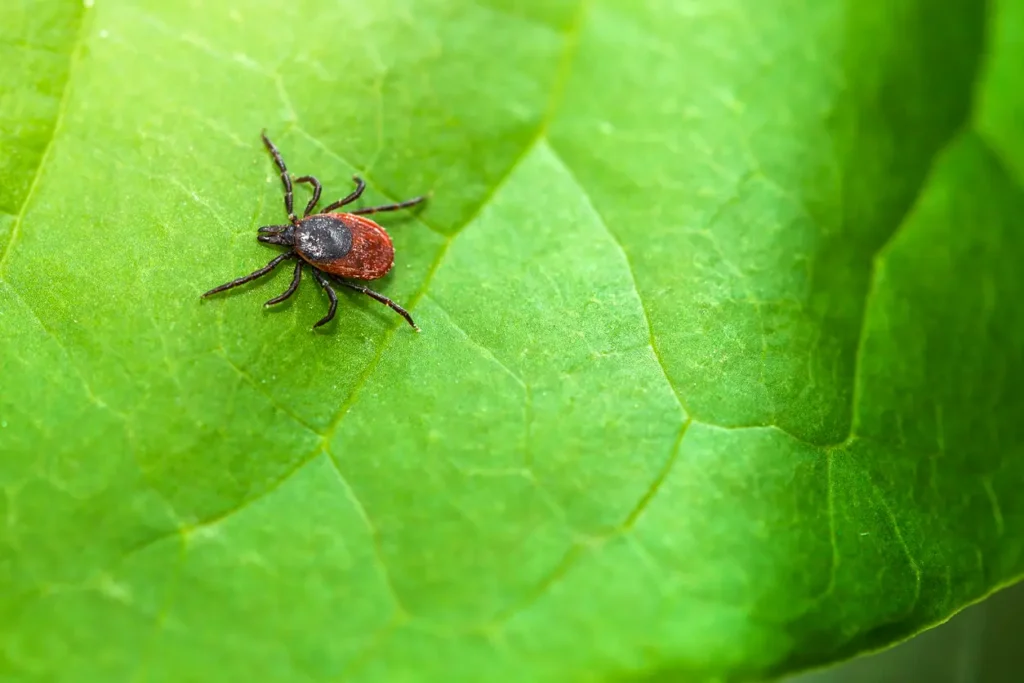
Effective Tick Treatment Methods
At All U Need Pest Control, we combine science-backed treatments with local know-how to eliminate ticks and reduce the conditions that attract them. After a thorough inspection, we customize a plan that reflects your property’s layout, your family’s routines, and Charleston’s seasonal patterns.
Here are some of the treatment options we may use to control ticks:
Habitat Modification
One of the most effective ways to control tick populations is by modifying the environment around your home. By reducing areas where ticks hide and breed, you can significantly lower the chances of an infestation. Some common habitat modification techniques include:
- Seal any entry points to prevent ticks from entering your house
- Trim back shrubs, grass, and plants that might attract ticks
- Clear away firewood piles, rocks, and leaves that provide shelter for ticks
- Let more sunlight into shaded areas to dry moisture and deter ticks
In Charleston’s humid climate, we also recommend creating clean zones between lawn and wood lines, using gravel or wood chips as buffers, and keeping play areas and dog runs in sunnier, well-drained sections of the yard.
Chemical Treatments
Where habitat work alone isn’t enough, targeted applications help rapidly reduce populations. We focus on tick transit corridors—brushy edges, fence lines, under-deck zones, and kennel perimeters. Our technicians use professional formulations and application techniques that maximize coverage while prioritizing your family’s and pets’ safety.
Targeted Applications
Severe or persistent activity calls for precision. We target nest-prone zones and high-traffic harborage with products selected for the specific species and life stage present. This source-first approach speeds knockdown and helps prevent quick rebound—especially important during Charleston’s long warm season.
Education
Effective tick control is a partnership. We explain where ticks are most active on your property, how to manage pet exposure, and which landscape practices best deter ticks over time. Simple changes—like repositioning a dog bed, removing a wood pile, or altering irrigation—can pay long-term dividends.
Our comprehensive tick control process includes:
1. Inspection
We begin with a full-property assessment that maps harborage zones, likely questing areas, entry points, and pet transit routes. This on-the-ground intelligence guides a plan built around your exact risk profile.
2. Treatment
Next, we apply targeted treatments to the areas where ticks hide and hunt. We emphasize edges, shady and humid spots, crawl-space perimeters, and pet-use areas—all while calibrating product choice and timing to Charleston’s weather patterns.
3. Maintenance
To keep numbers down year-round, we schedule follow-ups that track seasonal shifts and re-establish protective zones. Maintenance services are especially valuable before spring spikes and after major rain events or landscaping changes.
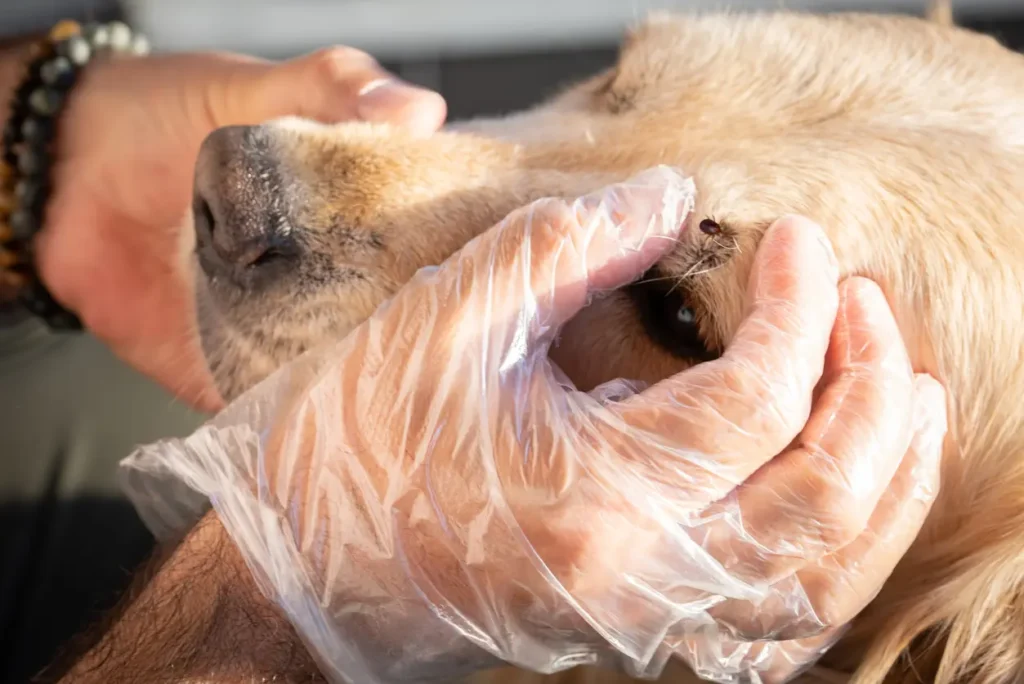
Pet-Safe and Eco-Friendly Solutions
Your family, pets, and Charleston’s coastal ecosystems come first. Our programs are designed to be effective and responsible, minimizing product footprint while maximizing results.
Earth-Friendly Treatments
When appropriate, we deploy treatments with botanically derived or reduced-risk active ingredients and use precise application methods that target where ticks live—not where people lounge. This focused approach provides powerful results while respecting sensitive Lowcountry landscapes.
Minimum-Risk Pesticides
We avoid indiscriminate “blanket” tactics and instead choose products and placements that deliver control with a favorable safety profile. For families with children, elderly relatives, or pets, this balance of efficacy and responsibility is essential.
IPM
Integrated Pest Management (IPM) ties everything together—inspection, habitat modification, product selection, timing, and monitoring. In Charleston, IPM means accounting for humidity cycles, shade patterns, wildlife movement, and homeowner habits. Done right, IPM reduces call-backs, lowers bite risk, and keeps protection steady through the hottest months.

How to Prevent Ticks
Professional service works best when paired with smart daily habits. In Charleston’s climate, a few consistent practices can dramatically reduce encounters.
Change Your Landscaping
Keep grass cut, thin dense shrubs, and clear leaf litter—especially along wood lines and fence bases. Create mulch or gravel buffers around play sets and patios, and position gardens and dog runs in sunnier, breezier zones where ticks are less likely to thrive.
Invest in Tick Repellents for Pets
Use veterinarian-recommended tick preventives consistently (topicals, collars, or orals). Check pets after walks—especially after exploring parks, greenways, and beach-adjacent trails—and wash bedding regularly. Reducing pet-host exposure is one of the most effective ways to cut household tick risk.
Spray Repellent on Your Clothes
Before yardwork, hiking, or gardening, apply an EPA-registered repellent to clothing and exposed skin. Treating shoes and socks can be particularly effective since ticks often quest low and climb upward.
Wear the Right Clothing
Long sleeves and pants—lightweight and breathable for Charleston’s heat—reduce skin exposure. Tuck pants into socks for yardwork or trail time, and choose light-colored fabrics so it’s easier to spot ticks before they attach.
Check for Ticks After Outdoor Activities
Shower within two hours of coming indoors, and perform a thorough tick check. Use a mirror to inspect scalp, behind ears, the nape of the neck, armpits, waistband, backs of knees, and ankles—places ticks commonly latch on.
Avoid Areas That Might Contain Ticks
Stay on the center of trails and away from tall grass and brushy edges. In your yard, keep pathways clear and prune back vegetation that touches walkways, patios, and porches where people congregate.
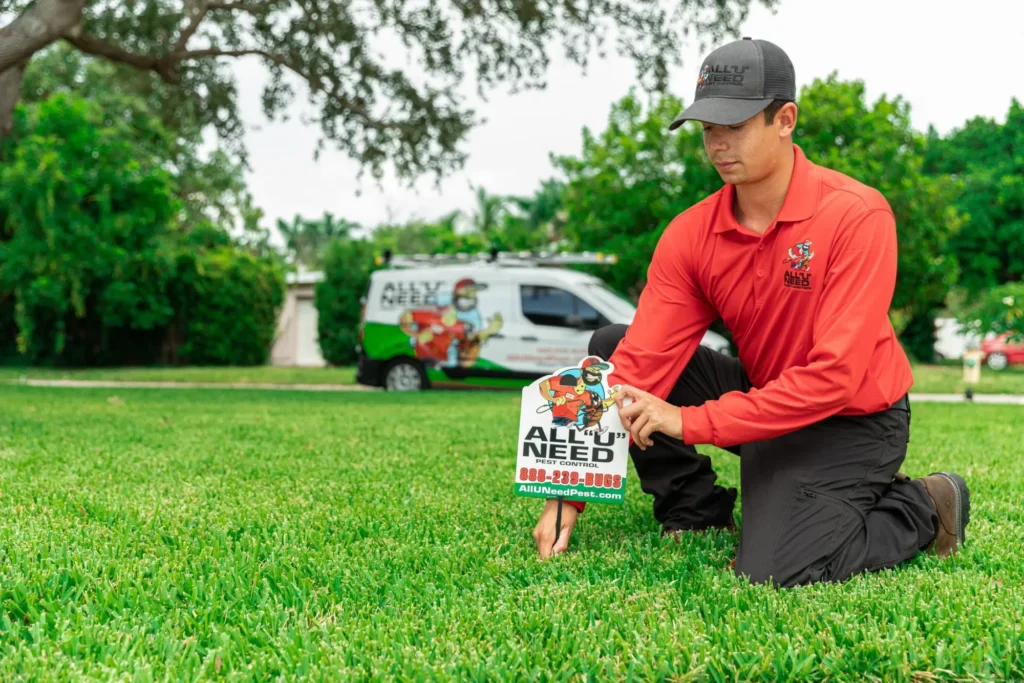
Choose All U Need Pest Control for Tick Control in Charleston, SC
Ticks don’t have to come with the Lowcountry lifestyle. If you’re seeing bites, pulling ticks off pets, or noticing activity in shady, brushy parts of your yard, All U Need Pest Control is ready to help. We’ve built our service model around Charleston’s climate, architecture, and outdoor culture—delivering targeted treatments, clear communication, and dependable follow-through.
From single-family homes in West Ashley and Mount Pleasant to townhomes on Daniel Island and historic properties downtown, we tailor our plans to match your property and your priorities. We aim for more than a quick knockdown—we build long-term protection that keeps your yard a place to relax, entertain, and let the dogs run free.
Don’t wait for the next warm front to trigger a surge. Call 1 (888) 239-BUGS or contact us online to schedule your inspection and get a customized tick control plan for Charleston, SC. With All U Need Pest Control, you’ll enjoy the outdoors again—without the worry.
Location Contact:
419 N Cedar St Summerville, SC 29483
Get Directions for 419 N Cedar StSummerville, SC 29483 on Google Maps843-489-8818
Call All "U" Need Pest Control